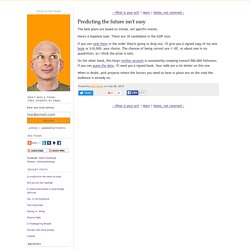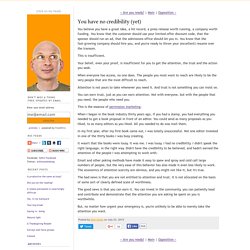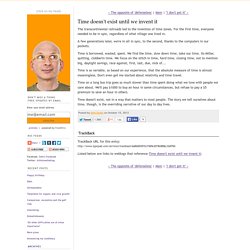

Ten questions for work that matters. When things go wrong. A protocol for moving forward: 0.

Double check the work to make sure that there are no other problems within it. 1. The illusion of control. It’s modern and very widespread.

It motivates us, frightens us and drives our consumer mania: The idea that we are in control. That our work is so leveraged and important that through force of will, we can ensure that things will turn out as we choose. We extend this to our sports and hobbies and adventures, as well. The compelling belief that we’re almost in control, that we’re right at the edge, that this ski run or this play or this experience will be the one we earned through our extensive planning and investment and skill.
Financial advisors and travel businesses and everyone in between peddles us the story that if we just team up with them, we’ll get exactly what we expect, that it will all be as we dreamed it to be. Make three lists. Predicting the future isn't easy. The best plans are based on trends, not specific events.

Here's a hopeless task: There are 18 candidates in the GOP race. If you can rank them in the order they're going to drop out, I'll give you a signed copy of my new book or $10,000, your choice. The chances of being correct are 1:18! , or about one in six quadrillion, so I think the prize is safe. "Can we talk about this?" You have no credibility (yet) You believe you have a great idea, a hit record, a press release worth running, a company worth funding.

"Because it has always been this way" Promotion, demotion and opportunity. The power of fear. Agreeing on the problem. Please don't tell us it's complicated.

Organizations, scientists and individuals always do better in solving problems that are clearly stated. The solution might be complicated, the system might be complex, but if we don't agree on the problem, it's hard to find the resources and the will to seek out a solution. For a business, the problem might be that: there aren't enough customersgross margins are too lowword of mouth is poorhiring sufficiently talented people is too difficultcompetition just moved in next doorproduction quality is off. Identify and agree on any of these and we can get to work. Empathy. Make three lists. The power of fear. The illusion of control. Time doesn't exist until we invent it. The transcontinental railroads led to the invention of time zones.

For the first time, everyone needed to be in sync, regardless of what village one lived in. A productivity gap. Authority as an excuse for complacency. "I thought you knew what you were doing...

" One of the principles of being on the bus, in the class or in your seat is that you are along for the ride. The teacher/boss/driver knows what he's doing, just shut up and sit still. Apparently, we have come to embrace this. It's safer, and easier too. With this worldview, all blame clearly goes to the people in charge, and powerlessness is a seductive habit.
What a shame. In an industrial setting, giving up our independence in exchange for eager compliance can lead to productivity and thus success. The internet is an organizing tool, a connection to billions of others. The feedback you've been waiting for. The hard work of understanding. Might as well burn that bridge all the way down to the pilings. "But what if I fail?" Two ways to listen. The opposite of why is now. The right moment. Seth's Blog: "How do I get rid of the fear?" The tiny cost of failure. The most important thing. The fear of freedom. The problem with problems. We have limits.

There are challenges, limited resources, people or organizations working against you. Your knee hurts, the boss is a jerk, the systems are down. We have opportunities. There are opportunities, new sources of leverage and ideas just waiting to be embraced. You can share something, give something, make something better. There are always limits, and there are always opportunities. The problem with problems is that they always keep us from focusing on opportunities, on a chance to contribute and to make something better. Gratitude and opportunity create more of the same. Choices. We can't talk about it.
Fear of public speaking. Very few people are afraid of speaking.

It's the public part that's the problem. What makes it public? After all, speaking to a waiter or someone you bump into on the street is hardly private. I think we define public speaking as any group large enough or important enough or fraught enough that we're afraid of it. And that makes the solution straightforward (but not easy). Start with dogs. Work your way up to a friend, maybe two friends. The enemy of creativity... You are what you share. I have a friend who can always be counted on to have a great book recommendation handy.

Another who can not only tell you the best available movie currently in theatres, but confidently stand behind his recommendations. And some people are eager to share a link to an article or idea that's worth reading. Go for a walk. We don't care enough to give you constructive feedback. But if we did, it would take a lot to speak up in a useful way. The stories we tell ourselves. Here's one: "I'm too old to make a difference, take a leap, change the game... " (Sometimes, I hear this from people who are 27 years old).
This is a seductive story, because it lets us off the hook. Obviously, the thinking goes, the deck (whichever deck you want to pick) is stacked against me, so no need to even imagine the failure that effort will bring. Better to just move along and lower my expectations. Hannes Schwandt has published some interesting research on this. Doctor, scientist and speaker Jonathan Sackner-Bernstein wakes us up with this powerful new TEDx talk: To overcome an irrational fear... Hope and expectation. Control or resilience. It's tempting to invest time, money and emotion into gaining control over the future. Security guards, written policies, reinforced concrete—there are countless ways we can enforce our control over nature, random events and fellow humans. The problem is that while the first round of control pays huge dividends (keeping rabbits out the yard is a good way to make your garden grow), over time more control creates brittleness. Goals, strategy and tactics for change.
The Goal: Who are you trying to change? What observable actions will let you know you've succeeded?